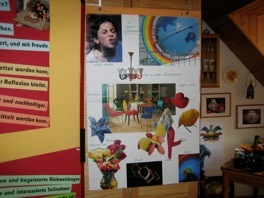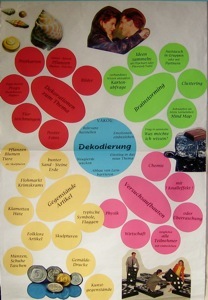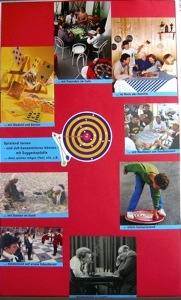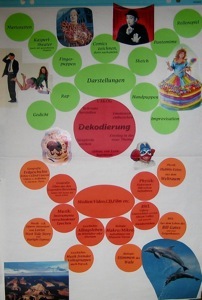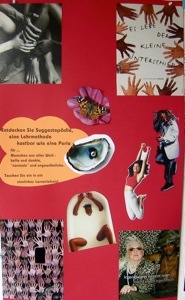The Training Cycle

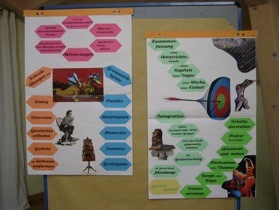
Learning Environment / Setting Up The Room
Integrating health aspects and ergonomics points of view
* A very inviting room / surrounding with full spectrum lighting
* Comfortable chairs arranged in semi- or full circle,
* Learning posters, pictures, plants or flowers
* Drinking water availability at all times,
* Music
-
*and last but not least:
-
* the friendly welcome by the facilitator.
New Theme, Topic, Training, Lesson
Preparation for new topics (Decoding)
The decoding is supposed to:
* create interest and wake curiosity.
* awake enthusiasm and create relevancy, you can use
- interesting posters regarding the new themes,
- pictures about the teaching contents,
- fascinating books,
- brainstorming to tap the knowledge of the learners,
- fitting music to touch emotions
- lead learners on a mental (fantasy) journey ... and more.
The Presentation / Offering The Teaching Contents
1. Classic Learning Concert
Input of new teaching contents
Instead of the typically frontal presentation of the learning
matter you will be much more successful if you
... use text forms, read or spoken,
-
*if at all possible in dialog form,
-
*that are amply illustrated
-
*include a wide variety of emotions,
-
*with classic music in the background,
* where the learners can read silently along.
Learning Through And With Movement.
Creating Short Breaks / Change of State
After question-and-answer sessions
and especially after longer sitting periods you offer
* stretching
* easy and soft yoga
* light exercises,
* imaginative exercises having to do with the learning contents,
* softball games and even sometimes dances
And Why?
- attentiveness increases,
- the circulation gets going,
- with open windows you fill up with oxygen,
- the general mood picks up -
Learning IS Movement.
Learning Exercises:
* There is a wide array of fun and effective movement games
with which you can help anchor learning contents of all kinds,
not only in training of adults, but in schools as well.
Important Repetition in Language Teaching
(Pseudo-Passive Learning Concert)
1. Repetition in class:
Using baroque music in the background the text
is being read the second time,
* with regular speed and enunciation
* The learners can read along, but they don't have to, they can just listen -
* The students create their own film in their minds as the story unfolds again.
First Exercises In Language Teaching During Training or In Class
(Primary Activations)
Repetitive exercises of immediate text input
There are various patterns with which students can practice the
immediate text:
* with enjoyable whole-group-exercises,
that help everyone to practice "under cover" within the group
and the possibility to try out the pronunciation and the melody
of the new language.
Every single exercise is better than the commonly practiced
"one person reads and the rest listens"
and - they are a lot of fun!
First Steps Into Transfer
(Secondary activations)
Exercises beyond the immediate texts
Useful for all teaching matter, regardless of subjects,
* Putting learning contents into other contexts,
* Changing meaning and situations,
* Practicing various useful settings
-
*Trying out to put learning contents
-
* into life-like situations,
* Creating new dialogs,
-
*Playing around with idiomatic phrases,
-
* steps in processes,
Practicing can also be done with
-
-dominos. memories, board games,
-
- mazes and the like
- Real-life simulations and more
Resumé - Summary
(Integration)
Finishing off a session, a training, class, weekend, semester
At the end of any session of any length there should be a summary done,
which could be shorter or longer, formal or creative,
done by the facilitator or by the learners, like
-
*as a passive concert repeating steps of a process, vocabulary, tables, rules and
-
* regulations,
* as creating mind maps either each on their own, in pairs, or as a group
* making posters with any kind of material
After longer learning periods it can also make sense to
* let students do a sketch or role play,
* have them do a rap, make a poem or compose a song,
* or let them do a pantomime
... in order to facilitate the longer lasting learning process,
memory and retention.
Ingrid Assmann
MoCep teacher training institute
Ausbildungstrainerin für Suggestopädie
Co-Trainer. Dr. Ernst Assmann
Alte Poststr. 37
D-85356 Freising
Tel. +49 (0) 8161-67890
Fax +49 (0) 8161-23.16.83
